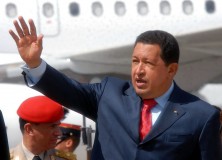The 2002 Coup Attempt against Hugo Chavez — Tristan Abbey

INTRODUCTION:
On April 11, 2002, top Venezuelan military commanders removed President Hugo Chavez from power in a classic coup d’état. Businessman Pedro Carmona assumed the presidency on April 12, but his support fragmented and he was forced to resign on April 13. By noon on April 14, Chavez had returned to power. The Venezuelan coup transpired over the course of just four days. The urgency of the narrow timeframe forced U.S. government agencies to respond immediately and instinctively, ultimately revealing that the national security establishment was prepared neither to properly anticipate nor react coherently to a crisis within its own hemisphere. Whether Washington supported or opposed the coup remained unclear throughout the crisis. The result was predictable: the U.S. government was accused of orchestrating the coup, on the one hand, and ridiculed for the coup’s failure, on the other.
STRATEGY:
Before the April coup, U.S. government officials consistently voiced their opposition to any “undemocratic and unconstitutional means” of removing Chavez from power. At the same time, agencies and organizations funded by the U.S. government operated in support of anti-Chavez democratic opposition groups and civil society efforts. In short, Washington hoped for a Venezuela without President Chavez, but was willing to wait.
INTEGRATED ELEMENTS OF NATIONAL POWER:
While various U.S. agencies and departments worked together reasonably well before the coup, they handled the actual crisis poorly. Some agencies issued statements implying recognition to and support of the Carmona government, despite the fact that Carmona had seized power through “undemocratic and unconstitutional” means. Later, these statements were reversed, but the damage to U.S. prestige and credibility had already been done.
EVALUATION:
The lack of coordinated strategy enabled American officials at different agencies to issue conflicting statements. Despite the Intelligence Community’s clear and consistent warnings of the potential for a coup, the State Department, the White House, and in-country officials had not agreed upon a shared plan of action in the event the forecasted coup materialized. Notably, at the time of the coup senior policy makers were distracted by other high-profile events, including counterterrorism actions and the Israeli-Palestinian conflict.
RESULTS:
The bungled U.S. response to the coup provided fuel to conspiracy theorists who believe that the Central Intelligence Agency operates as a nefarious force in the world, overturning regimes its masters dislike. Incoherent American statements helped bolster Hugo Chavez’s position in Venezuela by raising the specter of foreign interference in domestic affairs. Chavez further enhanced his standing by painting himself as a fearless leader willing to stand up, on behalf of Latin America, to perceived imperialist aggression. Finally, the American response allowed opponents of the United States to portray American foreign policy, with its commitment to democracy and the rule of law, as hypocritical.
CONCLUSION:
In April 2002, the U.S. government dealt ineffectively with the coup in Venezuela. It seemingly abandoned prior policy against extra-constitutional seizures of power with statements implicitly recognizing the new government, ignoring intelligence estimates that the coup would fail. When the coup fell apart, the U.S. government quickly condemned the plot, but the reversal could not undo resultant damage to American credibility. Clearly, the rapid events of the coup, and the fact that it occurred over a weekend, contributed to confusion. However, though a coup had been anticipated, no U.S. contingency plan was in place. Exacerbating the flawed response, intelligence was ignored and officials did not coordinate their agencies’ respective responses.